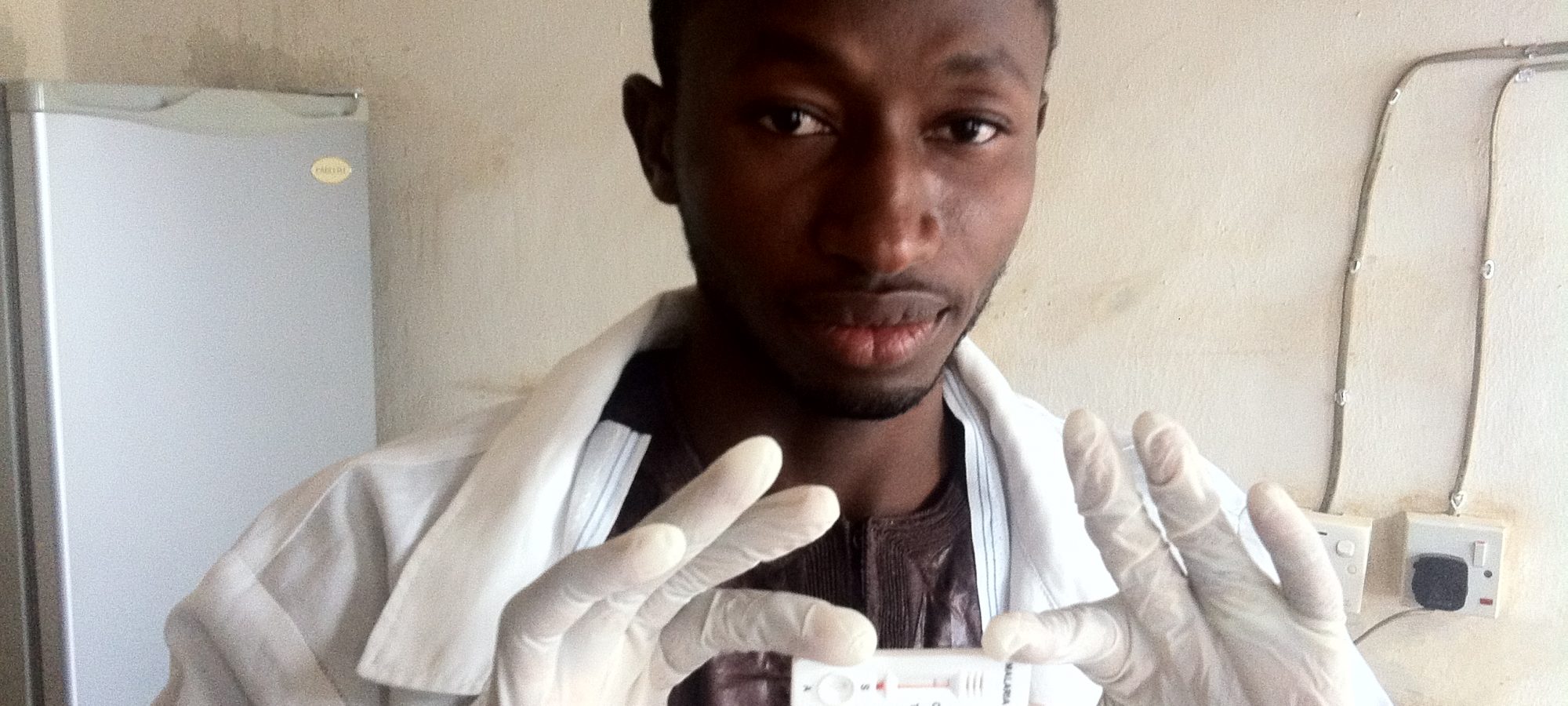Kabir Lawal, Market Support Officer under the Support to the National Malaria Programme (SuNMaP) project in Nigeria, interviews Sanni Garba, laboratory technician, in the rural community of Gauraka.
Sanni Garba is a healthcare professional in northern Nigeria. Today he is at the forefront of efforts to bring standardised malaria diagnostics to the people of Gauraka, a local community in which he grew up.
Garba is a laboratory technician at the government’s Gauraka Model Primary Health Centre in Tafa Local Government Area, Niger State. Garba has been working at the health centre for around six months.
Stepping into his small laboratory within the complex, he carefully slips his white latex gloves on to both hands as he prepares to demonstrate a rapid diagnostic test (RDT) for malaria. In the laboratory, he also carries out other tests, including those for typhoid fever and urinalysis.
On a typical day at work, Garba says with respect to RDT testing: “Sometimes, we have three, sometimes we have four, and sometimes we have none.” When asked the reason for the low patient numbers, he responded: “Patients prefer to go to Wuse in the Federal Capital Territory, Abuja or Suleja, a neighbouring town, which possess more equipped and larger hospitals.” But it is also true that through the work of SuNMaP, rural health workers and community care givers are helping to keep down the number of people coming to the health centre with malaria by diagnosing and treating fever in the community, talking about malaria prevention and the importance of mosquito nets, and through the provision of nets through mass distributions and ante-natal clinics.
Garba carefully tears the flexi-pack of the test kit and lays the kit on his work table. He then takes blood from a blood specimen bottle and places a few drops on a rectangular window in the test cassette. When testing an actual patient, he would be required to prick the fourth finger (counting from the thumb) and then collect a very minute sample of blood which he would then drop onto to the cassette.
After this, he adds a few drops of the buffer solution before waiting 15 minutes wait for the test results to emerge. At the Gauraka Model Primary Health Centre, RDTs are not given out for free but are sold for 200 Nigerian naira (US$1.25).
Garba’s role at the health centre has greatly reduced the chances of malaria misdiagnosis. He has also gained a lot of experience in rapid diagnostic testing. He takes a short glance at the RDT kit that had lain undisturbed on his work table, then says with a smile: “Practice makes perfect.” He then holds up the cassette to display the result and gives a short interpretation of the reading.
Proper diagnosis of malaria is an important step in the prevention of resistance to anti-malarial drugs. Professionals such as Garba are working to support better case management of malaria in communities across Nigeria.
SuNMaP (Support to National Malaria Programme ) provides support to the Nigerian government and people in tackling the massive burden of malaria in the country. It is implemented by international and local partners, funded by UKAid and managed by Malaria Consortium. SuNMaP works in close co-operation with Nigeria’s National Malaria Control Programme (NMCP), in selected states and Local Government Areas (LGAs), including Anambra, Kano, Lagos states, Niger, Katsina and Ogun states. Work began in a further four states in 2012.
These positive changes have been facilitated by Support to National Malaria Programme (SuNMaP) and other donors in collaboration with the State Malaria Control Programme (SMCP). In addition to bed nets and drugs for malaria treatment, SuNMaP has provided training to senior management staff at the Local Government Authority (LGA) level, which has been cascaded down through the LGA to staff, like Garba, in health facilities across Nigeria.
